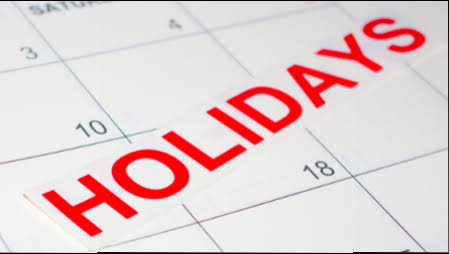Nigerians are originally hardworking people, from sunrise to sunset, Nigerians at various levels are always hustling with little or no time to rest.
Our brothers and sisters in the bubbling and busy city of Lagos will understand the situation better.

The few times Nigerians have to rest is either when they are sick, or on public holidays.
Even on some holidays, many people still find themselves working.
Luckily, Nigerians observe several public holidays throughout the year.
These holidays are designated by the government and often reflect the country’s cultural diversity and religious makeup.
Some people are not fully aware of the many public holidays observed in Nigeria, or perhaps they are aware but oftentimes forget or get carried away in the haste to make money.
A perfect scenario is what played out on Easter Monday, when Mr Bamidele, a resident of Lagos State stormed out of his house early in the morning and headed straight to the office.
If not for the emptiness of the bus stop, he would have wasted his money on transportation.
It was at that empty bus station that Bamidele realised that it was a work free day.
Imagine how many people would have been in Bamidele’s situation. Now you understand the saying “information is power”.
This article, which embodies a comprehensive list of public holidays typically observed in Nigeria, would help you avoid such situations.
Are you ready? Let’s go.
1. New Year’s Day – January 1
Celebrates the beginning of the new year in the Gregorian calendar.
2. Good Friday
Observed on the Friday before Easter Sunday, it commemorates the crucifixion of Jesus Christ.
3. Easter Monday
Celebrated the day after Easter Sunday, marking the resurrection of Jesus.
4. Workers’ Day – May 1
Also known as Labour Day, it celebrates the achievements of workers and the labor movement.
5. Eid al-Fitr
A movable feast, this Islamic holiday marks the end of Ramadan, the holy month of fasting. The date varies each year based on the lunar Islamic calendar.
6. Democracy Day – June 12
Commemorates the restoration of democracy in Nigeria with the election of June 12, 1993.
7. Eid al-Adha
Known as the Feast of Sacrifice, this Islamic holiday occurs approximately 70 days after Eid al-Fitr, commemorating Ibrahim’s (Abraham’s) willingness to sacrifice his son as an act of obedience to God.
8. Independence Day – October 1
Celebrates Nigeria’s independence from British colonial rule in 1960.
9. Eid al-Mawlud (Mawlid al-Nabi)
The observance of the birthday of the Islamic prophet Muhammad, the date varies according to the Islamic lunar calendar.
10. Christmas Day – December 25
Celebrates the birth of Jesus Christ, observed by Christians worldwide.
11. Boxing Day – December 26
Traditionally, a day to open Christmas boxes and share gifts, it is observed as a public holiday in Nigeria.
You May Like: FG Declares Friday, Monday As Public Holidays
The dates for the Islamic holidays of Eid al-Fitr, Eid al-Adha, and Eid al-Mawlud vary each year, as they are determined by the sighting of the moon according to the Islamic lunar calendar.
The federal government of Nigeria usually announces specific dates for these holidays each year after consultations with the Nigerian Supreme Council for Islamic Affairs.

